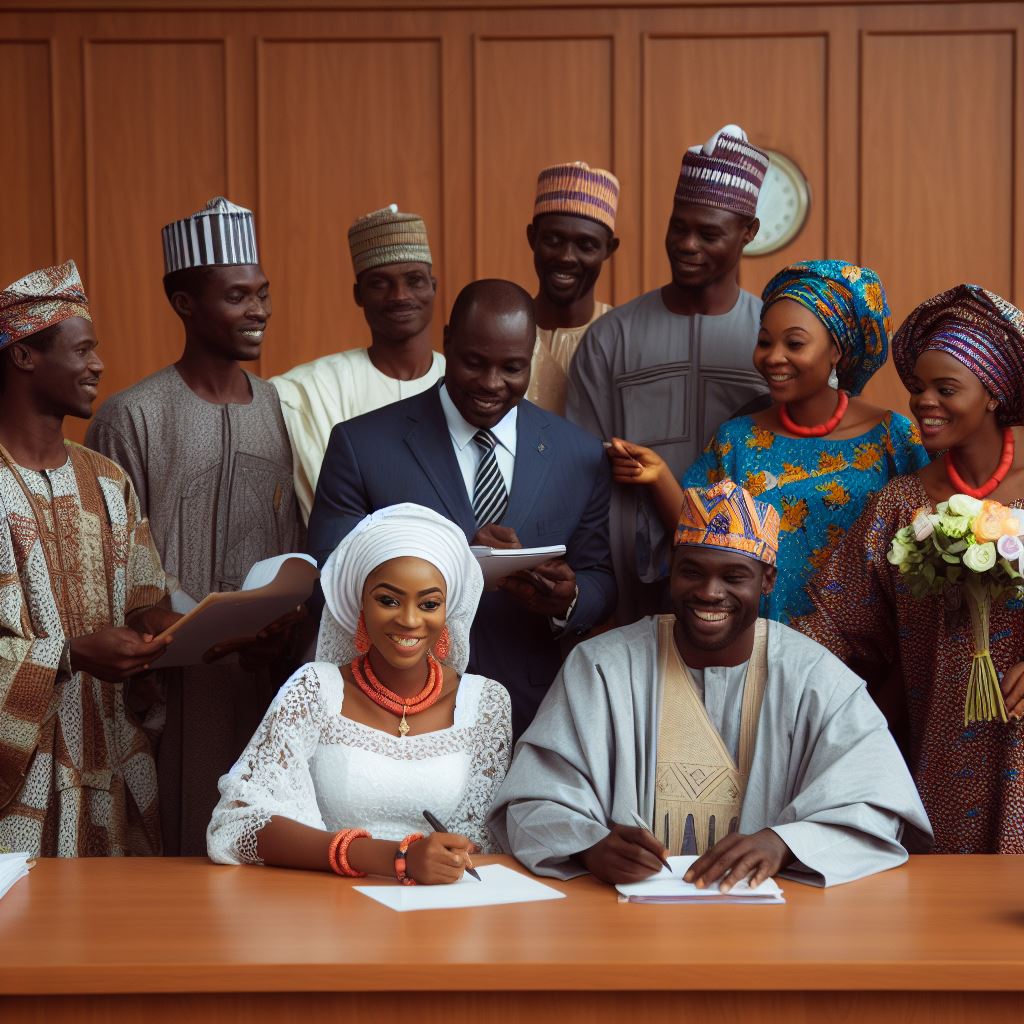Marriage Registration in Nigeria: A Step-by-Step Guide
Last Updated on October 17, 2023
Introduction
Marriage is a sacred union, but in Nigeria, it’s not just about love.
Marriage registration plays a pivotal role in safeguarding the rights of couples and their children, ensuring legal recognition, and providing access to various benefits.
The purpose of this blog post is to demystify the often complex and confusing process of marriage registration in Nigeria.
We’ll break it down into easy-to-follow steps, making it accessible to anyone considering tying the knot within the country.
Whether you’re a Nigerian citizen or a foreigner planning to marry in Nigeria, understanding the marriage registration process is essential.
It offers legal protection, inheritance rights, and access to social services. We’ll ensure you navigate this important journey with confidence and clarity.
The subsequent sections will take you through the entire process, starting from the required documents, application submission, and even post-registration details.
We’ve got you covered, so let’s begin this journey towards a legally recognized and secure union.
Read: How the Marriage Act in Nigeria Affects Property Rights
General Overview of Marriage Registration in Nigeria
Marriage registration in Nigeria refers to the process of legally recording a marriage according to the laws of the country.
It is an essential step to formalize a union between two individuals.
The legal implications of marriage registration in Nigeria are significant.
The Marriage Act requires that we register a marriage for it to be valid and legally binding.
Failure to register a marriage can lead to various legal, social, and financial consequences.
Significance of Obtaining a Marriage Certificate
- Proof of Marriage: A marriage certificate serves as legal evidence of the existence of a valid marriage. The government officially recognizes and registers the marriage, providing proof of its legitimacy.
- Legal Rights and Privileges: Obtaining a marriage certificate grants spouses certain legal rights and privileges, such as inheritance rights, property ownership, social security benefits, and access to healthcare services.
- Legal Protection: A registered marriage offers legal protection for both parties in case of disputes, separation, or divorce. It provides a legal framework for resolving issues related to custody, alimony, and division of assets.
- International Recognition: Foreign jurisdictions often require spouses to present a marriage certificate to recognize them as a married couple. It is crucial for visa applications, immigration processes, and facilitating cross-border legal rights.
- Social Acceptance: Marriage registration adds social credibility and acceptance to a relationship. It signifies commitment, legitimacy, and responsibility in the eyes of society, family, and friends.
- Prevention of Forced Marriages: Marriage registration helps prevent forced marriages and protects individuals from illegal or exploitative unions. It ensures that both parties voluntarily consent to the marriage and are of legal age.
Additional Significance
- Dissolution of Marriage: In the event of a divorce or dissolution of marriage, a registered marriage provides a clear legal process for separation, reducing potential conflicts and complications.
- Securing Children’s Future: A registered marriage facilitates the legal establishment of parentage, ensuring the rights and well-being of children, including inheritance rights and access to financial support.
- Statistical Data: Marriage registration helps gather important statistical data on marriages, which is crucial for policy-making, planning, and implementation of social welfare programs.
- Respect for Religious and Cultural Practices: Marriage registration respects the diversity of religious and cultural practices by offering the option of religious or customary marriages while ensuring compliance with legal requirements.
Basically, marriage registration in Nigeria is an essential legal process that carries significant implications for couples.
Obtaining a marriage certificate provides not only legal recognition and protection but also social acceptance and various rights and privileges.
It is important for individuals to be aware of the legal requirements and benefits associated with registering their marriage to ensure a secure and respected union.
Read: The Role of Witnesses in Statutory Marriages: Nigeria’s Perspective
Step-by-Step Guide on Marriage Registration in Nigeria
Step 1: Eligibility and Requirements
In Nigeria, there are legal requirements that must be met before marriage can take place.
The first requirement is age, as both parties must be at least 18 years old.
Consent is another important factor, and both individuals must freely give their consent to the marriage.
Capacity to marry is also essential, which means that both parties must not have any existing legal restrictions that prevent them from getting married.
When it comes to the necessary documents, couples must provide their birth certificates or age declaration affidavits.
They also need to present valid means of identification, such as their Nigerian passports or national identity cards.
Additionally, individuals who have been previously married must provide evidence of the dissolution of their previous marriages.
Step 2: Notice of Marriage
To start the marriage registration process, couples must give notice of their intention to get married.
They can do this by visiting their local marriage registry and submitting a notice of marriage.
The notice should include the full names, addresses, occupations, and ages of both individuals.
It is important to note that the notice must also be published in a national newspaper at least 21 days before the intended wedding date.
This publication allows interested parties to raise any objections or concerns about the proposed marriage.
Step 3: Waiting Period
After submitting and publishing the marriage notice, a 21-day waiting period is mandated.
During this time, objections can be raised before proceeding with registration.
Objections trigger investigations, potentially delaying or canceling the marriage.
Step 4: Verification and Documentation
During this stage, the information provided in the notice of marriage will be verified.
Couples may be required to provide additional documents, such as evidence of their places of residence.
Both parties will also have to make a statutory declaration, confirming that the information provided is true and accurate.
The registrar may conduct interviews with the couple separately to ensure that there is no coercion or fraud involved.
Step 5: Registration
Once all the necessary documentation and verifications have been completed, the actual registration process can begin.
Couples will be required to fill out marriage registration forms, providing details about themselves and their witnesses.
They will also need to provide the necessary documents, such as their birth certificates and means of identification.
The registrar will oversee this process and ensure that all the required information and documents are provided.
Step 6: Issuance of Marriage Certificate
After registration, authorities will issue the couple a marriage certificate, offering legal proof for name changes and benefits. Safeguard it for future legal needs.
By following this step-by-step guide, couples can navigate the marriage registration process in Nigeria smoothly and legally.
Ensure meeting eligibility requirements and providing necessary documents for a successful registration is crucial.
The process may seem complex, but with proper guidance and adherence to the requirements, couples can start their married life on the right legal footing in Nigeria.
Read: Legal Requirements for Valid Marriages Under Nigerian Law

Frequently Asked Questions (FAQs)
Addressing common questions and concerns related to marriage registration in Nigeria
1. Who can register a marriage in Nigeria?
Any couple who meets the legal requirements can register their marriage in Nigeria.
Both parties should be at least 18 years old and not already married.
2. Can foreigners get married in Nigeria?
Yes, foreigners can get married in Nigeria.
They must follow the same registration process and provide the necessary documentation.
3. What documents are required for marriage registration in Nigeria?
Couples need to provide the following documents:
- Valid identification cards or passports.
- Birth certificates or age declaration affidavits.
- Two passport-sized photographs.
- Marriage declaration forms obtained from the registry.
- Marriage certificate obtained from the registry after the ceremony.
4. Where can I register my marriage in Nigeria?
Couples can register their marriage at any local government office or marriage registry in the state they reside in.
5. When should I register my marriage?
It is advisable to register your marriage as soon as possible after the wedding ceremony. Some registries have specific timeframes within which registration should occur.
6. What is the process for marriage registration in Nigeria?
The process involves:
- Collecting the required documents.
- Visiting the local government office or marriage registry.
- Submitting the necessary documents and completing application forms.
- Paying the registration fee.
- Attending a brief interview and signing the marriage register.
- Obtaining the marriage certificate.
7. How long does it take to register a marriage in Nigeria?
The registration process usually takes about 2 to 6 weeks, depending on the workload of the registry and the accuracy of the provided documents.
8. Can I register my marriage online in Nigeria?
Currently, there is no online marriage registration system in Nigeria. Couples must physically go to the registry to complete the process.
9. What happens if I do not register my marriage?
Failure to register a marriage can create legal and administrative complications.
It may be challenging to prove the existence of the marriage in matters such as inheritance or child custody.
10. Can I register my marriage retrospectively?
Yes, it is possible to register a marriage retrospectively in Nigeria.
However, additional requirements and processes may vary depending on the circumstances and the registry’s discretion.
11. Can I change my marital status after marriage registration?
Report marital status changes, like divorce or death, to the registry where you registered your marriage.
The necessary documents should be provided to update the records.
Generally, marriage registration in Nigeria is a crucial step to formalize a union and protect the rights and obligations of the couple.
By following the required procedures and providing the necessary documentation, couples can ensure the legal recognition of their marriage.
It is essential to address any questions or concerns promptly to avoid complications in the future.
Read: Marriage Act in Nigeria: Implications for Interfaith Couples
Conclusion
Marriage registration in Nigeria is of utmost importance for several reasons.
It provides legal recognition and protection for spouses, offers rights and benefits, and ensures the legitimacy of the marriage.
To ensure a smooth registration process, it is crucial to follow the step-by-step guide provided in this blog chapter.
By doing so, couples can avoid unnecessary delays, complications, and legal issues.
For those seeking further assistance or additional resources, there are various options available.
Consult a marriage registrar or visit the Nigerian government agency for marriage registration.
They can provide accurate information, answer questions, and guide individuals through the process.
Additionally, online forums or communities can be helpful for sharing experiences and seeking advice from others who have gone through the registration process.
Remember, registering your marriage is not just a legal requirement, but it is also an important step in securing your rights and protecting your union.
It demonstrates a commitment to your relationship and provides a solid foundation for a happy and secure future together.
So, don’t delay, follow the step-by-step guide and ensure a hassle-free marriage registration in Nigeria.


